Pagos digitales
La tecnología digital está transformando la manera en que respondemos a las emergencias. Las innovaciones abarcan desde cómo identificar a las personas elegibles para recibir asistencia, hasta la recopilación de datos para evaluaciones y monitoreo, así como la comunicación con las comunidades afectadas por situaciones de crisis. Los sistemas de pago digital, incluidos los dispositivos móviles, cupones electrónicos y tarjetas (cuando se utilizan apropiadamente) pueden proporcionar asistencia más oportuna, más segura, más eficaz en relación al costo, y más inclusiva. Sin embargo, a medida que el volumen de los datos personales que recogemos, almacenamos y compartimos sobre la gente crece, debemos garantizar que nuestros sistemas de protección de datos se mantienen al día, y que comprendemos y mitigamos los riesgos inherentes a las nuevas tecnologías.
Últimos recursos

Delivery Mechanism Mapping for Cash Based Interventions in Cox’s Bazaar Bangladesh
Report
The ‘Delivery Mechanism Mapping for Cash Based Interventions (CBI) in Cox’s Bazaar, Bangladesh’ was conducted in December 2017 by a ‘Cash Champion’ deployed from Catholic Relief Services (CRS) with the support of the Global Shelter Cluster and ECHO, and involved consultations with numerous...
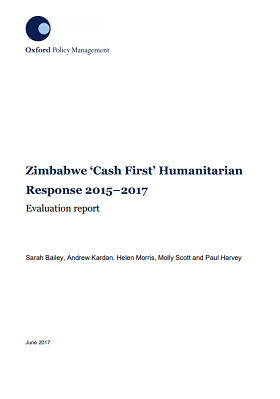
Zimbabwe ‘Cash First’ Humanitarian Response 2015–2017: Evaluation Report
Report
CARE International and World Vision International (WVI) in Zimbabwe implemented the UK Department for International Development (DFID)-funded project ‘Emergency Cash First Response to Drought-Affected Communities in the Southern Provinces of Zimbabwe’ from August 2015 to April 2017. The project...

Managing Cash-Based Programmes in a Volatile Markets Contexts: The Case of Delivering Cash Using Mobile Money During the Zimbabwe Cash Liquidity Crisis
Report
This case study examines how the Zimbabwe national cash crisis evolved and the ways in which affected communities and the CTP adapted to the challenges it posed. The study highlights what worked well, what was less effective, and some other possible future opportunities. It also provides operational...

Cash or in-kind? Why not both? Response Analysis Lessons from Multimodal Programming
Report
This research reviews lessons learned about response analysis from multimodal responses, that is, responses in which practitioners determined that more than one response modality between cash,vouchers, and in-kind, was a “best fit” or in which the conclusions about “best fit” changed over...

Kenya Red Cross Society Using New Technology to Reach Communities in Hardship Areas
Report
Kenya Red Cross Society responded to the severe drought through cash transfers in Marsabit county. Unlike an earlier drought, where KRCS used manual system to pay beneficiaries in the same geographical area, this year the organisation used a payment technology provided by a company called Compulynx....

A buffer against the drought
Report
The Government of Kenya in partnership with DFID undertake a long term social protection program(Hunger Safety Net Program) in Northern Kenya reaching out to poor households with bi monthly cash transfers. So much investment has been put in this program including pre-registration and carding of...
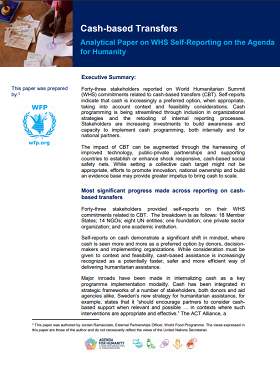
Cash-based transfers. Analytical Paper on WHS Self-Reporting on the Agenda for Humanity
Report
Forty-three stakeholders reported on World Humanitarian Summit (WHS) commitments related to cash-based transfers (CBT). Self-reports indicate that cash is increasingly a preferred option, when appropriate, taking into account context and feasibility considerations. Cash programming is being streamlined...
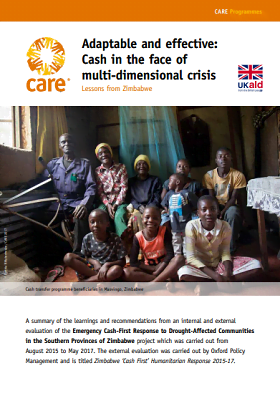
Adaptable and effective: Cash in the face of multi-dimensional crisis
Report
A summary of the learnings and recommendations from an internal and external evaluation of the Emergency Cash-First Response to Drought-Affected Communities in the Southern Provinces of Zimbabwe project which was carried out from August 2015 to May 2017. The external evaluation was carried out by Oxford...
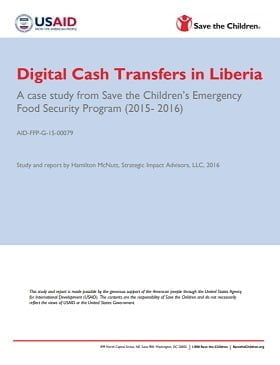
Digital Cash Transfers in Liberia. A case study from Save the Children’s Emergency Food Security Program (2015- 2016)
Report
Through its USAID-funded Emergency Food Security Program, Save the Children was the first organization to implement cash transfers through mobile money at scale in Liberia, where mobile money services are nascent. From liquidity management to incentivizing agents, the challenges, lessons, and...
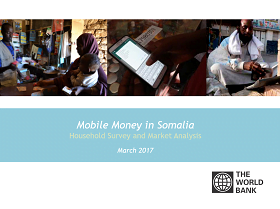
Mobile Money in Somalia – Household Survey and Market Analysis
Report
Key findings from an assessment of mobile money in Somalia. Provides information about mobile money penetration; practicalities; usage; perceptions and the use of shillings versus dollars.

ELAN Humanitarian KYC Case Studies
Report
Know Your Customer (KYC) regulations, also known as customer due diligence, are designed to combat money laundering, terrorist financing, and other related threats to the financial system. They refer to the ID checks that financial institutions perform to comply with national financial regulations....

Can E-Transfers Promote Financial Inclusion in Emergencies: A Case Study from Ethiopia
Report
The Electronic Cash Transfer Learning Action Network (ELAN) launched this research to build an evidence base around connecting emergency electronic transfer (e-transfer) recipients with additional financial
services. They also wanted to learn if, when, and how e-transfers can promote sustained uptake and...

The Financial Journey of Refugees Full Report
Report
This document details how refugees and migrants from the Middle East, South and Central Asia and East, West and North Africa finance their journeys and manage money along the way.
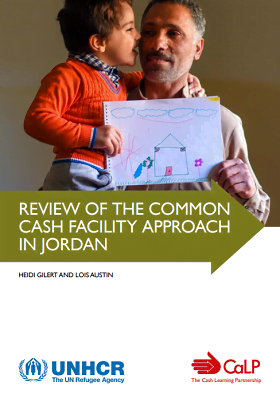
Review of the Common Cash Facility approach in Jordan
Report
The United Nations High Commissioner for Refugees (UNHCR) in Jordan has pioneered a collaborative, multi-stakeholder approach to the delivery of cash, known as the Common Cash Facility (CCF). The aim of the CCF is to provide humanitarian actors with direct and equal access to a common financial service...

Cash Delivery Mechanism Assessment Tool
Guidelines and Tools
In line with its commitment to institutionalise the use of Cash-Based Interventions (CBIs), the office of the United Nations High Commissioner for Refugees (UNHCR) released the Operational Guidance for Cash-Based Interventions in Displacement Settings (“the Guidelines”) dated 4 February 2015, to...

E-transfers Procurement Learning and Good Practices
Guidelines and Tools
Humanitarian agencies have increased their use of cash transfers and related distribution technologies. Yet, most rely largerly procurement and contracting processes designed for goods and professional services. An Elan Survey of humanitarian operations staff and e-transfers providers indicated several...
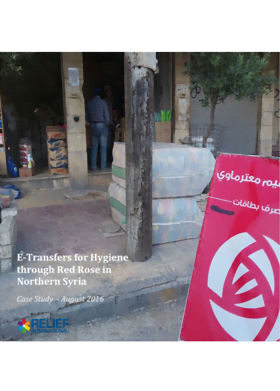
E-Transfers for Hygiene through Red Rose in Northern Syria
Report
Cash is receiving a lot of attention globally and is currently being scaled-up at the highest level. On the 9th February 2016, the UN Secretary-General Ban Ki-moon launched his report for the World Humanitarian Summit, calling for cash-based programming to be the ‘default method of support for affected...
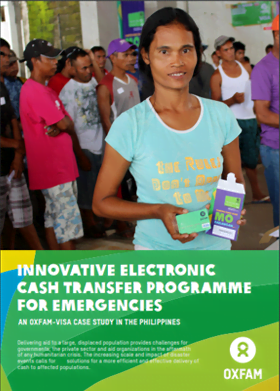
Innovative Electronic Cash Transfer Programme for Emergencies. An Oxfam Visa case study in Philippines
Report
On November 8, 2013, super Typhoon Haiyan (local name Yolanda) struck the Philippines, killing more than 6,000 people, and displacing an estimated 4.4 million individuals. Through its cash transfer programme, Oxfam conducted cash for work activities, and provided cash asset recovery to more than...
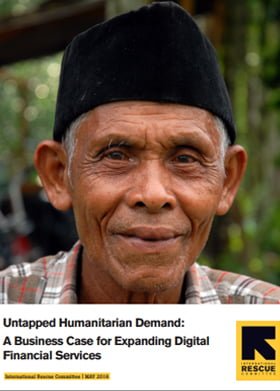
Untapped Humanitarian Demand: A Business Case for Expanding Digital Financial Services
Report
The International Rescue Committee, commissioned Strategy Impact Advisors to build a return on investment (ROI) model to estimate whether or not a business case exists for expanded coverage of digital financial services in crisis-prone areas (Lebanon and the Philippines). This analysis provides...
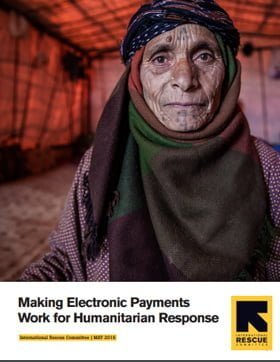
Making Electronic Payments Work for Humanitarian Response
Report
The dialogue leading up to the WHS has cast a spotlight on humanitarian cash transfers. Significant global attention has centered on the role of cash transfers in bringing efficiency to the humanitarian system and improving outcomes for crisis-affected populations. U.N. Secretary-General Ban Ki-moon has...


